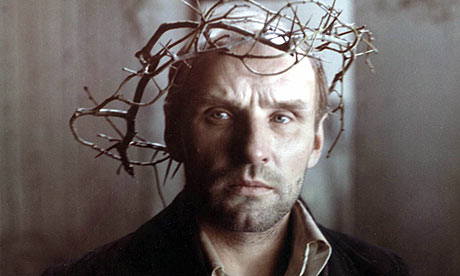Hustlers.
Aside from it being an almost Dickensian look into the world of hustlers (or male prostitutes, if we get a bit more direct), the film is also a tear-jerking look at how great of a loss River Phoenix really is to the movie industry and also to the furthering of the Marlon Brando-esque leading man mystique in films. From the minute River, with all his James Dean-like mannerisms and uncanny good looks, enters the frame, one can't help but be sad about the wasted potential of what he could have been and what wonders he could have done working with other talented filmmakers. In a way, this was his great coming-out party as a truly serious dramatic actor, and he didn't disappoint. And if Keanu Reeves' character Scott, a rich heir who, for reasons unclear, has chosen to be a hustler instead, is the one highly pivotal in terms of the film's connection with Shakespeare's "Henry IV", River Phoenix's role is its throbbing heart and aching soul, and he makes us feel every single ounce of his character's silent cries through his narcoleptic ways as a hassled hustler.
Though set in the polluted streets and dingy sidewalks of modern-day America, the film is surprisingly flowery in its wordings (to of course keep up with its Shakesperean roots) and perhaps often a bit stagy on how the washed-up characters describe off-screen events and explain themselves to their fellow low-lives. Sometimes, though, the film then suddenly switches from overlong, quasi-poetic utterances to brief, street-smart talks, which makes it quite incomprehensible and, subsequently, infuriating to watch at times.
Gus Van Sant, an openly gay filmmaker, is equal parts brave, bold, and even elegant in directing this film that even the more explicit sex scenes were shot in a series of beautiful, tableaux-like images that seem to be a very tasteful aesthetic choice on his behalf. There's no denying the fact that the themes explored in "My Own Private Idaho", from homosexuality to downright prostitution, is hard to portray in a cinematic manner that would not tread the territories of exploitation and smut. Yet Van Sant, who has directed his fair share of modern film classics ranging from the Oscar-winning "Good Will Hunting" to the shocking indie gem "Elephant", has never let that happen, for he knows that although the highly sensitive issue of homosexuality is the area where the film extracts its primary emotional force from, the film is still simply about this gay man (River Phoenix's character) who just wants to find his mom and also to love somebody on the side, and isn't that, regardless of gender, the default story of our lives?
As expected, with this being the story of male prostitutes, it is a given that odd fetishes will be handed enough share of the spotlight, just like the ones in "Belle de Jour" and especially in "Midnight Cowboy", a film that, I believe, is kins in spirit with "My Own Private Idaho". There's the singing Udo Kier, for one, and also the fat client who seems to get off when he hears the sound of cleaning brushes making contact with dirty floors. And in the middle of the oddity of it all and these night people who seem to be more of themselves when the sun is out, stands River Phoenix's Mike and his struggle to literally keep himself from constantly falling asleep and also to keep whatever's left of his memory of her mother, who seems to continuously pester his mind with recurring childhood scenes of Oedipal-like affection.
Physically speaking, the character is already challenging for River Phoenix to play because there's the difficult obligation of accurately portraying narcolepsy on-screen. And then, there's the trickier part of mustering all the fragile nuances of playing someone as emotionally scarred as Mike and then keeping them all at bay so that he can project a false sense of street grit. Jon Voight, who played Joe Buck in "Midnight Cowboy", has finely captured that, but Phoenix, I think, has even perfected it. I don't know, perhaps I'm a bit biased about his greatness in the role simply because he's already no more, but there's a kind of elegy in his eyes and in his actions that makes the experience of watching him play someone as tragic as Mike even more heart-rending, and dwarfs Keanu Reeves' unexpectedly effective performance all the more.
"My Own Private Idaho", though included in many 'essential films' list, is by no means a masterpiece, but it's the kind of movie, no matter how happy and contented you are with your life by the time you've decided to pop it into your DVD player, that will certainly make you seek your own private whatever, in terrible longing for loneliness. It's an odd feeling, but it sure is something.
FINAL RATING






















